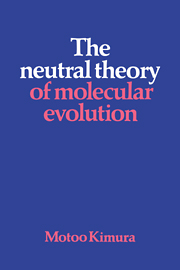Book contents
- Frontmatter
- Contents
- Preface
- Introduction
- 1 From Lamarck to population genetics
- 2 Overdevelopment of the synthetic theory and the proposal of the neutral theory
- 3 The neutral mutation-random drift hypothesis as an evolutionary paradigm
- 4 Molecular evolutionary rates contrasted with phenotypic evolutionary rates
- 5 Some features of molecular evolution
- 6 Definition, types and action of natural selection
- 7 Molecular structure, selective constraint and the rate of evolution
- 8 Population genetics at the molecular level
- 9 Maintenance of genetic variability at the molecular level
- 10 Summary and conclusion
- References
- Author Index
- Subject Index
2 - Overdevelopment of the synthetic theory and the proposal of the neutral theory
Published online by Cambridge University Press: 05 August 2012
- Frontmatter
- Contents
- Preface
- Introduction
- 1 From Lamarck to population genetics
- 2 Overdevelopment of the synthetic theory and the proposal of the neutral theory
- 3 The neutral mutation-random drift hypothesis as an evolutionary paradigm
- 4 Molecular evolutionary rates contrasted with phenotypic evolutionary rates
- 5 Some features of molecular evolution
- 6 Definition, types and action of natural selection
- 7 Molecular structure, selective constraint and the rate of evolution
- 8 Population genetics at the molecular level
- 9 Maintenance of genetic variability at the molecular level
- 10 Summary and conclusion
- References
- Author Index
- Subject Index
Summary
Formation of the synthetic theory as the orthodox view
In the previous chapter, a history of the theories on the mechanism of evolution was presented — a history leading to the establishment of classical population genetics by Fisher, Haldane and Wright early in the 1930s. In discussing the synthesis of Darwinism with Mendelian genetics, there is one more name that we should not forget. This is H.J. Muller who by the early 1920s had elucidated the fundamental nature of gene mutation and its bearing on evolution by natural selection.
His dramatic demonstration of the mutagenic action of X-rays (Muller, 1927) for which he was later awarded the Nobel Prize is well known. But less well known are his fundamental contributions to our understanding of the mechanism of evolution. He propounded forcefully the view that the basis of adaptive evolution by natural selection lies in the remarkable property of the gene that not only is each gene self-reproducing, but also mutated forms of a gene are again self-reproducing (Muller, 1922, see also p. 175 of Muller, 1962). Natural selection, then, can be defined as the differential multiplication of mutant types. He went so far as to claim (Muller, 1929, see p. 188 of Muller, 1962) that the gene is the very basis of life.
- Type
- Chapter
- Information
- The Neutral Theory of Molecular Evolution , pp. 15 - 33Publisher: Cambridge University PressPrint publication year: 1983
- 3
- Cited by



